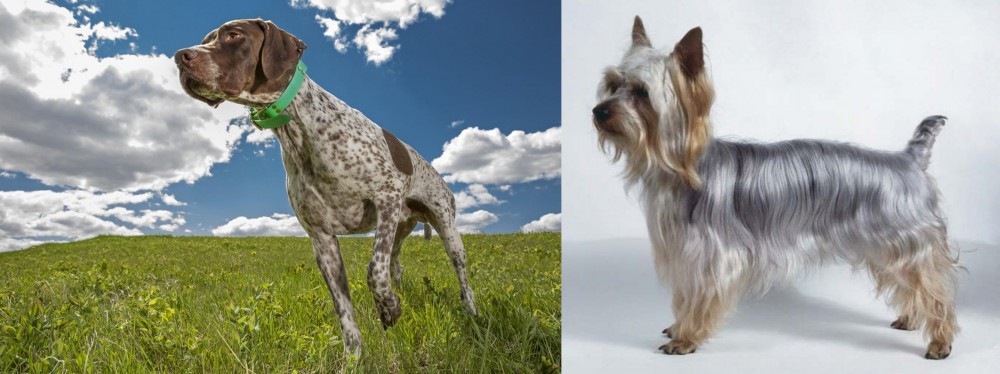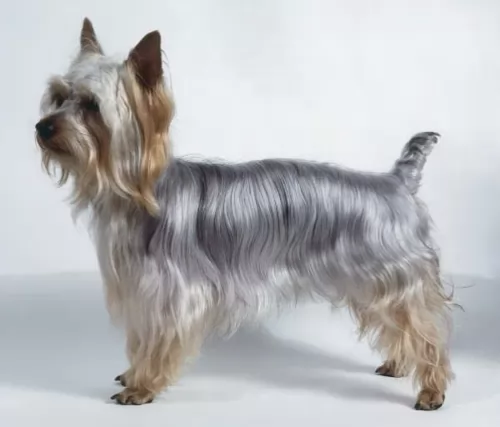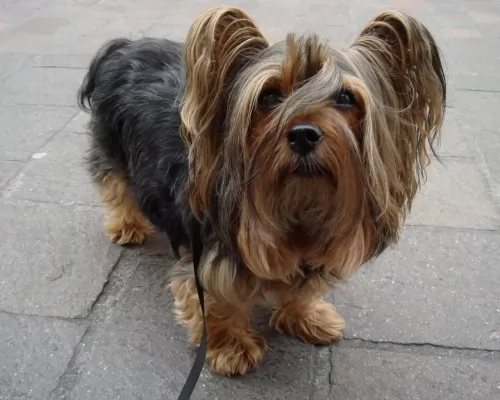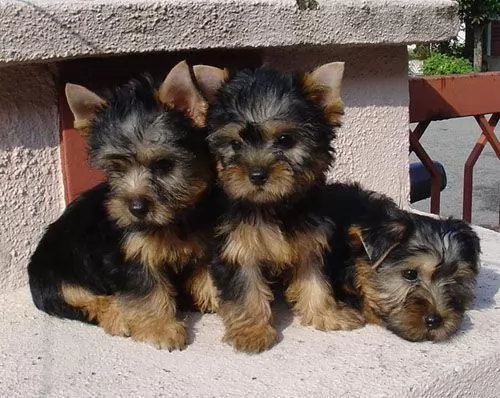 Petzlover
Petzlover Braque Francais (Pyrenean Type) is originated from France but Silky Terrier is originated from Australia. Braque Francais (Pyrenean Type) may grow 32 cm / 13 inches higher than Silky Terrier. Braque Francais (Pyrenean Type) may weigh 50 kg / 111 pounds more than Silky Terrier. Both Braque Francais (Pyrenean Type) and Silky Terrier has almost same life span. Braque Francais (Pyrenean Type) may have more litter size than Silky Terrier. Braque Francais (Pyrenean Type) requires Low Maintenance. But Silky Terrier requires Moderate Maintenance
Braque Francais (Pyrenean Type) is originated from France but Silky Terrier is originated from Australia. Braque Francais (Pyrenean Type) may grow 32 cm / 13 inches higher than Silky Terrier. Braque Francais (Pyrenean Type) may weigh 50 kg / 111 pounds more than Silky Terrier. Both Braque Francais (Pyrenean Type) and Silky Terrier has almost same life span. Braque Francais (Pyrenean Type) may have more litter size than Silky Terrier. Braque Francais (Pyrenean Type) requires Low Maintenance. But Silky Terrier requires Moderate Maintenance
 The Braque Francais Gascognes and the Braque Francais Pyrenees are two alike dogs that are in reality separate breeds. The Pyrenees is not as rare as his larger brother, Gascognes. Around since the 15th century at least, not mush is really known about their origins. Because the Braque Francais was exported or taken to so many different countries in the 15th-18th centuries, a lot of information regarding the origins of the breeds were lost. There was a major study done in the 19th century that showed the two dogs came from very different blood lines. It is known that in this timeframe there was an acute need for a dog that was better than the current hunting breeds. This dog needed to be able to point, track, retrieve and flush.
The Braque Francais Gascognes and the Braque Francais Pyrenees are two alike dogs that are in reality separate breeds. The Pyrenees is not as rare as his larger brother, Gascognes. Around since the 15th century at least, not mush is really known about their origins. Because the Braque Francais was exported or taken to so many different countries in the 15th-18th centuries, a lot of information regarding the origins of the breeds were lost. There was a major study done in the 19th century that showed the two dogs came from very different blood lines. It is known that in this timeframe there was an acute need for a dog that was better than the current hunting breeds. This dog needed to be able to point, track, retrieve and flush.
With no authenticated story of origin, many myths have grown up in the vacuum. The most common belief is that the Chien d’Oysel, an ancient spaniel breed that was medium sized with brown or white fur and brown markings, is an ancestor of the Braque Francais and local hunting dogs. To make the Gascognes larger and stronger than the Pyrenees, local scent hounds were also crossed with these dogs. The Pyrenees does not have these scent hounds in their background.
Until the late 1800’s, there was only one type and one breed of Braque Francais. But when the breed was no longer the dogs of a nobility, the average hunter needed a smaller dog. Urbanization following the French Revolution added to this trend and the Pyrenees Mountain hunters crossed the Gascognes with smaller scent hounds and pointers. Thus, they created the Braque Francais Pyrenees and each dog became its own breed in 1920.
The Braque Francais breed club, including standards for both breeds was established in 1850 with the standards established in 1880. This acceptance was then followed by registration of both breeds in the International Kennel Club (FCI) and the French Kennel Club. Canada recognizes only the Gascoigne and the United Kennel Club (UKC) of the United States, recognized both. Neither breed has been recognized by the American Kennel Club (AKC).
The Second World War was brutal to both types of the Braque Francais, but the Pyrenees have surpassed their sister breed and are the only one that has found its way to North America. The importers have started a breeding program in Canada. Later a few were imported to the States. There are currently at least four breeders in North America – 2 in the U.S. and 2 in Canada. It is thought that there are less than 200 Braque Francais Pyrenees living in North America.
 It is the Yorkshire Terrier and the Australian Terrier which are the ancestors of the Australian Silky Terrier. This is by no means a new dog breed. It is believed that the breed came into existence at the end of the 19th century.
It is the Yorkshire Terrier and the Australian Terrier which are the ancestors of the Australian Silky Terrier. This is by no means a new dog breed. It is believed that the breed came into existence at the end of the 19th century.
The dog’s purpose is to be a companion. This little canine wasn’t always known as the Silky Terrier, but in 1955 the name became officially Silky Terrier.
The breed is also recognized by the Australia National Kennel Council in the Toy Group. In fact the breed is recognised by a number of the major kennel clubs as well as the Fédération Cynologique Internationale.
 The Braque Francais breeds are medium sized dogs with the Pyrenean standing 10 centimeters shorter than the Gascogne. They have a, white or chestnut brown coat with brown spots and a brown head. The Pyrenees has a head that is broader and ears that are not as long as the Gascogne. Their muzzle is narrower. He is strong, tall with hanging lips and square muzzles.
The Braque Francais breeds are medium sized dogs with the Pyrenean standing 10 centimeters shorter than the Gascogne. They have a, white or chestnut brown coat with brown spots and a brown head. The Pyrenees has a head that is broader and ears that are not as long as the Gascogne. Their muzzle is narrower. He is strong, tall with hanging lips and square muzzles.
 This is a small dog breed, standing at just 21 to 26cm in height and weighing in the region of 4 to 5kg. He may be a toy dog, but he is robust and athletic.
This is a small dog breed, standing at just 21 to 26cm in height and weighing in the region of 4 to 5kg. He may be a toy dog, but he is robust and athletic.
The ears of the Silky are small and erect with a lot of silky hair that hangs down and the tail is preferably docked and held high.
His coat is eye-catching – straight, long, silky and shiny. If it is left unclipped, it will reach the floor. The colour of the coat is a tan and silvery grey.
The temperament of any dog is affected by things such as heredity, upbringing and the training and socialization he receives.
Small he may be, but the Silky Terrier can benefit from training as he is feisty and strong willed.
He is energetic and always ready for action. He is ready to come bounding after you and join his human family for any action they’re into. He is playful, bold, loyal, tenacious, independent, social and lively and he makes a good playmate for children.
He might tend to be a bit snappy and aggressive towards other dogs. He is also great as a watchdog, barking and alerting you to strangers.
 This is a sociable, lovable, friendly breed. They are gentle and docile dogs that want only to please you. They like children as well as adults and will never be a guard dog as they are friendly to strangers as well. The Braque Francais Pyrenees is affectionate while being highly skilled hunters. They are prone to severe separation anxiety if left alone for long. They might even have a tendency toward shyness.
This is a sociable, lovable, friendly breed. They are gentle and docile dogs that want only to please you. They like children as well as adults and will never be a guard dog as they are friendly to strangers as well. The Braque Francais Pyrenees is affectionate while being highly skilled hunters. They are prone to severe separation anxiety if left alone for long. They might even have a tendency toward shyness.
 The silky terrier is a good choice for those who want a smallish dog but one which is robust and adventurous.
The silky terrier is a good choice for those who want a smallish dog but one which is robust and adventurous.
Your Silky is a loyal dog who loves spending time with his human family, wanting their companionship.
He will need to be physically and mentally stimulated as he is bright and intelligent. He can adapt to life in the city or the countryside but will need to be well exercised wherever he is.
 The breed of Braque Francais in both its incarnations is generally a pretty healthy dog. They are prone to several issues including dysplasia of the elbow and hip, aortic stenosis, some eye issues and patellar luxation. The eye issues are around the lids and include ectropion and entropion along with cataracts and progressive retinal atrophy (PRA). These issues are not avoidable, but the risk can be reduced even more by breeder testing of parents of any litter and then test the litter. Both the OFA and CERF should conduct tests for the dysplasia (Orthopedic Foundation for Animals) and eyes (Canine Eye Registration Foundation).
The breed of Braque Francais in both its incarnations is generally a pretty healthy dog. They are prone to several issues including dysplasia of the elbow and hip, aortic stenosis, some eye issues and patellar luxation. The eye issues are around the lids and include ectropion and entropion along with cataracts and progressive retinal atrophy (PRA). These issues are not avoidable, but the risk can be reduced even more by breeder testing of parents of any litter and then test the litter. Both the OFA and CERF should conduct tests for the dysplasia (Orthopedic Foundation for Animals) and eyes (Canine Eye Registration Foundation).
 Just like most other dogs, the Silky Terrier isn’t likely to get sick easily, but he can still succumb to any one of the dog illnesses there are.
Just like most other dogs, the Silky Terrier isn’t likely to get sick easily, but he can still succumb to any one of the dog illnesses there are.
This is when your pet isn’t able to regulate blood sugar levels. Your dog will be drinking a lot more water than usual and also be urinating more often. The vet will explain to you a special diet for your pet and how the disease can be controlled with insulin.
This is a disease seen more often in smaller dogs like the Silky. It is caused by an obstruction in the airway and symptoms can include labored breathing and coughing. Your dog will need to be treated with anti-biotics and possibly surgery.
 This breed need a high energy food including raw meat such as chicken, fish, and beef. If feeding kibble, they need about 2.5 cups per day.
This breed need a high energy food including raw meat such as chicken, fish, and beef. If feeding kibble, they need about 2.5 cups per day.
Prone to inflammation and infections of the ears as they are long and floppy. Clean them regularly. As previously mention eye disorders, joint dysplasia and bloat.
The Braque Francais Pyrenees is a fairly versatile hunting dog. They can hunt on all types of terrain by trailing, flushing and retrieving. They are quick and move quickly without actually sprinting. This dog needs serious exercise every day. They will walk or jog with you. They will run along side your bike. Whatever you choose to do, do it for an hour a day. Don’t make couch potatoes out of this breed. It will not turn out well if you do. They need a place where they can play off leash as well, such as a large yard or a dog park.
 You can imagine that with that silky hair, you’re going to have to be brushing your furry friend quite a bit. It’s such soft, silky hair that it easily picks up burrs and gets matted. You may want to get your pet to a professional groomer to have the hair cut. As you brush him, check for any unusual lumps and keep an eye on his skin.
You can imagine that with that silky hair, you’re going to have to be brushing your furry friend quite a bit. It’s such soft, silky hair that it easily picks up burrs and gets matted. You may want to get your pet to a professional groomer to have the hair cut. As you brush him, check for any unusual lumps and keep an eye on his skin.
Check your pet’s teeth. Bad teeth can cause bacteria that can affect every part of your dog’s body. Check inside his ears for redness and check his eyes that there is no discharge. Trim the nails. If you don’t have the time or the inclination to do all these things for him, make an appointment with the professional pet groomers who will do it for you.
The Silky Terrier will need quality food if you want him to enjoy a long, healthy life. Its always a good idea to have some of the top quality commercially manufactured dog foods with you for convenience. If you want to give him the best there is, some home-made food will be a good choice, if you keep it simple.
Boiled chicken, brown rice or pasta and spinach, sweet potatoes and carrots are a healthy choice for your pet – plain and simple without any exotic spices that could upset his stomach. Your dog will lap it up and you will see how he loves it. Chop the home-made food up and add some of it into his dry kibble as a treat twice a week.